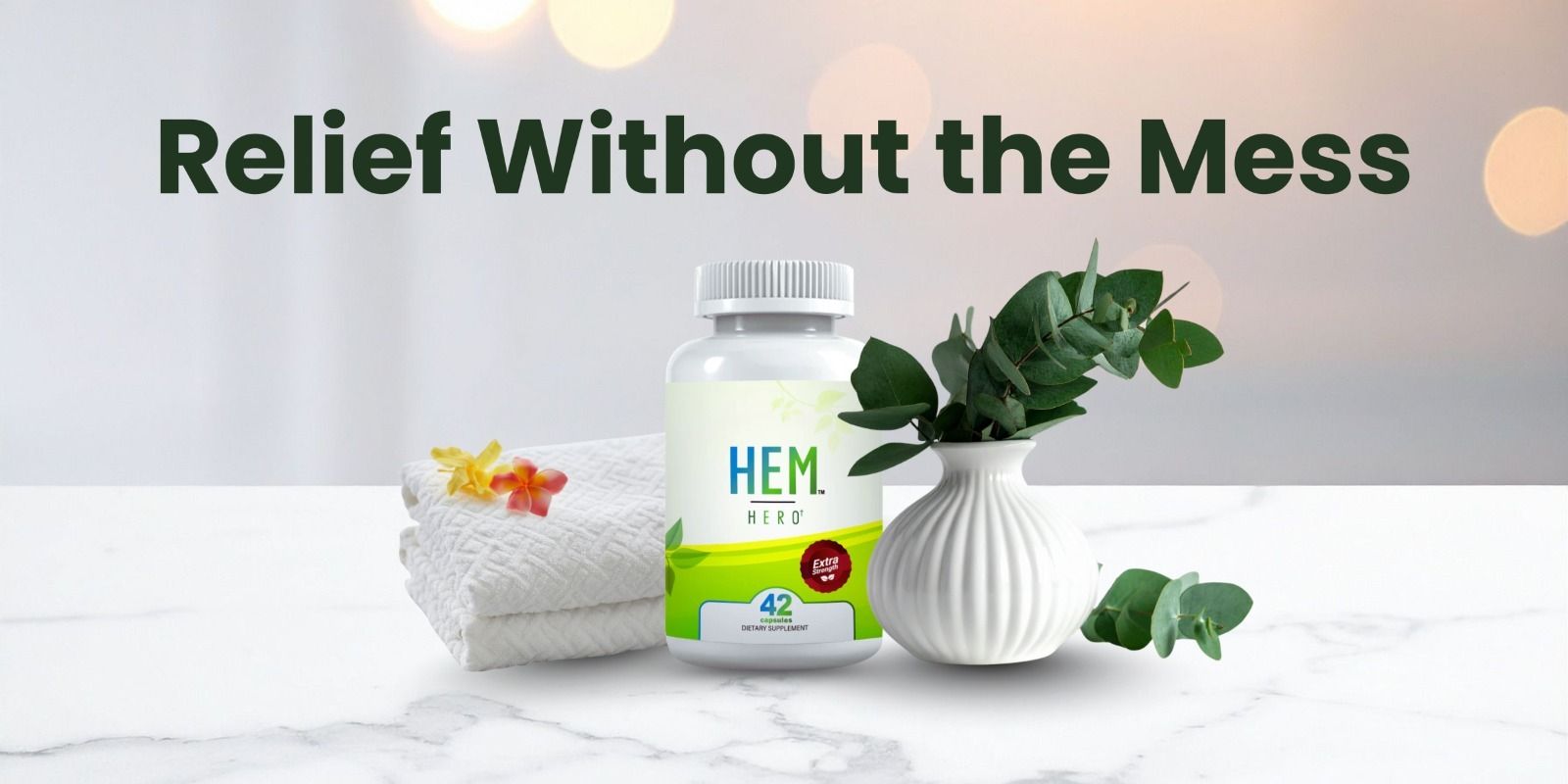
Good morning. In today’s edition:
There's New Evidence That Cruciferous Vegetables (Broccoli, Cabbage, Cauliflower and Kale) Blunt Spikes in Blood Sugar Levels, Which Could Be Particularly Important for Those With Type 2 Diabetes or Who Are at Risk, Finds Small Randomized Controlled Trial of 4 Serves a Day Over 2 Weeks
Weight Loss Hack
Common Cinnamon Metabolite Shows Potential for Alzheimer’s Treatment by Reducing Amyloid in Blood
Smoking or Vaping May Increase Your Risk of Diabetes
…and lots more. Have a great day!

Still Struggling With Hemorrhoids? You’re Not Alone.
You’ve tried it all—creams, wipes, even embarrassing surgeries—and still, the pain keeps coming back. The itching. The swelling. The fear of flare-ups at the worst possible moment.
You suffer in silence because no one wants to talk about hemorrhoids. But you’re done with short-term fixes and messy products that don’t work.
Hem Hero® is different.
This powerful oral supplement works from the inside out to help relieve discomfort, reduce swelling, and support healthy blood flow—naturally. No mess. No awkward moments. Just real, daily support in a small, easy-to-swallow capsule.
✓ Helps relieve pain and itching
✓ Supports vein strength and circulation
✓ Targets the root cause—not just the surface symptoms
✓ Discreet, simple, and effective
Thousands have already found comfort and control with Hem Hero®. Now it’s your turn.
👉 Order now and get Free Shipping on orders over $79.99
👉 Subscribe and save 10%—cancel anytime
Don’t let hemorrhoids rule your life. Hem Hero® can help you feel like yourself again—without the mess, stress, or shame.
Transform Your Bedroom Fun With Legal THC Gummies
Imagine every touch magnified, every kiss electrified, every encounter intensified.
Made from 100% federally legal, rapid-onset THC, time-tested botanicals, and delivered quickly and discreetly to your door, Mood’s Sexual Euphoria THC gummies can help ignite your bedroom fun starting in just 15 minutes…
Transforming ordinary encounters into extraordinary between-the-sheets adventures.
FOOD & NUTRITION
There's New Evidence That Cruciferous Vegetables (Broccoli, Cabbage, Cauliflower and Kale) Blunt Spikes in Blood Sugar Levels, Which Could Be Particularly Important for Those With Type 2 Diabetes or Who Are at Risk, Finds Small Randomized Controlled Trial of 4 Serves a Day Over 2 Weeks

New research shows that eating certain vegetables—like broccoli, cabbage, cauliflower, and kale—can help control blood sugar levels. This may be helpful for people with type 2 diabetes or those at risk.
In a small study, 18 older adults ate four servings (about 1.5 cups) of vegetables each day for two weeks. Some ate cruciferous vegetables like broccoli and kale. Others ate root vegetables like potatoes and carrots. The researchers used blood sugar monitors to track changes throughout the day.
The group that ate cruciferous vegetables had fewer blood sugar spikes. Their levels stayed steadier after meals. This is important because big changes in blood sugar can harm health over time. More stable blood sugar is linked to better heart health and a lower risk of diabetes problems.
Researchers think natural plant compounds like sulforaphane might play a role, but they still aren’t sure how it works.
Other studies have shown that cruciferous vegetables may lower the risk of colon cancer and reduce blood pressure. Yet, many Americans don’t eat enough vegetables. In some areas, only 1 in 20 adults meet the daily goal.
These veggies can cause gas in some people, but cooking or blending them may help.
Adding even a small amount—like a side of cooked broccoli—to your meals could be a simple way to support better health.
Disclaimer: This article is for informational purposes only and is not medical advice. Talk to your doctor before making changes to your diet.
WEIGHT LOSS
Weight Loss Hack

If you’ve tried many diets but still struggle to lose weight—or lost weight only to gain it back—this simple eating plan might help.
This diet works by lowering insulin, a hormone that stores fat, and raising growth hormone, which helps protect your muscles. To do this, you cut your carbohydrates (carbs) as close to zero as possible. That means no sugar, bread, fruit, or processed foods.
Here’s what you can eat—as much as you want:
Beef (ground beef, steak, etc.)
Lamb or goat
Eggs (with yolks)
Butter (grass-fed if you can)
Liver and other organ meats
Bacon
Salt, water, black coffee, and tea
Avoid all other foods—no sweeteners, sauces, snacks, or breaded meats.
Eat one or two big meals a day during a 6-hour window (called “intermittent fasting”). For the other 18 hours, drink only water, coffee, or tea. Eat until you feel full—no calorie counting.
In the first 7–14 days, you may feel tired or irritable. That’s normal as your body adjusts. Add extra salt and make sure you get enough potassium and magnesium.
Many people feel better after just a few days. Some even see their blood sugar levels improve—especially those with type 2 diabetes or insulin resistance.
This plan is called a carnivore diet. It may sound extreme, but it has helped people lose fat when nothing else worked.
Disclaimer: For informational purposes only. Not medical advice.
HEALTH
Common Cinnamon Metabolite Shows Potential for Alzheimer’s Treatment by Reducing Amyloid in Blood

A new study shows that a compound related to cinnamon may help people with Alzheimer’s disease. The compound is called sodium benzoate. It’s often used as a food preservative and is already approved for some medical uses.
In this study, people with mild Alzheimer’s took sodium benzoate pills every day for 24 weeks. Those who took 750 mg or 1000 mg per day showed the most improvement in thinking and memory. They also had lower levels of a protein called amyloid-beta in their blood. This protein is believed to play a big role in causing brain damage in Alzheimer’s disease.
The people who had higher levels of amyloid-beta 1–42 at the start of the study seemed to benefit the most. Their memory scores improved more than those who had lower levels.
Most current treatments for Alzheimer’s must be given through an IV at the hospital. They can also cause side effects like brain swelling or bleeding. Sodium benzoate, however, is taken by mouth and had very few side effects in this study.
The study was short and included only people from Taiwan. So more research is needed to see if the results last and if they apply to people in other countries.
Still, the results are hopeful. A simple and widely available compound, found in cinnamon, might help slow down memory loss in Alzheimer’s.
Disclaimer: This article is for informational purposes only. It does not provide medical advice, diagnosis, or treatment. Always talk to your doctor.
Smoking or Vaping May Increase Your Risk of Diabetes

A new study from the University of Georgia shows that smoking and vaping may raise your risk of getting diabetes or prediabetes. Researchers looked at data from over 1.2 million people. They found that people who smoked or vaped were more likely to have blood sugar problems.
People who used both cigarettes and e-cigarettes had the highest risk. Their chance of getting prediabetes was 28% higher than people who didn’t use either. Smoking alone raised the risk by 15%. Vaping alone raised it by 7%. While 7% may seem small, it could mean 7,000 more prediabetes cases in the U.S. each year.
People who smoked or vaped were also more likely to be diagnosed with diabetes—not just at risk for it.
The study found that some groups had even higher risk. These included people who were overweight, had health problems, or were Black, Hispanic, or Asian. People with lower income were also more likely to get diabetes if they smoked or vaped.
The good news? Exercise helped. Smokers who exercised regularly cut their prediabetes risk by 8%.
Experts say this shows vaping may not be as safe as many think. Both smoking and vaping can affect more than just your lungs—they may also hurt your body’s ability to control blood sugar.
Disclaimer: This article is for informational purposes only and does not provide medical advice. Please talk to your doctor before making changes to your health habits.
✢ A Note From Hem Hero
The information in this health newsletter is for educational purposes only and is not a substitute for professional medical advice, diagnosis, or treatment; always consult your healthcare provider with any questions or concerns you may have regarding your health. The publishers are not responsible for any actions taken by the reader based on the information provided.


